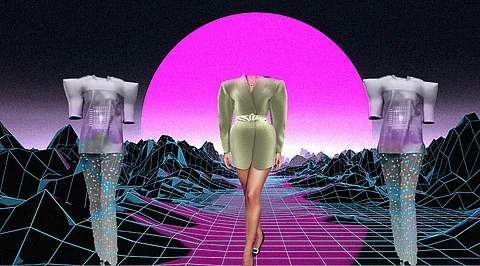
- Insights
- Cryptocurrencies
- Stocks
- White Papers
- Industry
- Geography
- Insights
- Cryptocurrencies
- Stocks
- White Papers
- Industry
- Geography


The metaverse is viewed as the next phase of how we use innovation — the successor of the internet age. Depending on who you ask, the metaverse can reach out to digital fashion, social media, virtual reality, augmented reality, virtual stores, video games, and non-fungible tokens (NFTs), implying that many brands started fiddling with metaverse standards even before the term became commonplace. As fashion turns out to be progressively settled in the metaverse, its core Gen Z customer base spends more of its time playing, socializing, and shopping there, understanding its full potential is crucial. Fashion in the metaverse sounds cool, but is it going to take a nasty turn soon?
Some might argue, what's the point of physical clothes? Generally, all that we wear has gone a long way past the essential capacity of apparel and is substantially more about utilizing fashion to address us in the manner we need to be seen by others. Nobody needs a £30 baseball cap and a £400 smartwatch. Accessories and clothing are substantially more about personalizing our appearance in the physical world. So, why should digital clothing be treated differently?
The clearest answer is that these clothes don't really exist and are simply comprised of pixels instead of materials. In any case, digital clothing contains everything we associate with traditional fashion. It's just not tangible. However, clients are wearing these clothes in everything from digitally altered photos to games or digital and hybrid worlds such as virtual reality or augmented reality.
Social media has transformed how people see themselves and present a version of themselves online. Many will routinely add augmented reality filters before sharing an image online, and this trend is beginning to impact the fashion world. For example, the creator of 'This Outfit Doesn't Exist' is bringing virtual clothing ranges to life as more and more turn to digital-only fashion to zhoosh up their Instagram feed.
Digital fashion celebrates inclusivity and promotes the idea that anyone, regardless of their body type, size, sexuality, or gender, can wear anything. The convergence of physical and digital worlds is often referred to as phygital. The trend is one of the main reasons retailers are preparing for an Extended Reality (XR) where the products we purchase are represented in both the physical and digital world.
As non-fungible tokens (NFTs) enter the mainstream, big brands are well into this trend. Nike acquired RTFKT and Adidas is exploring how to provide their customers with exclusive merchandise and virtual experiences. Even Gucci and Louis Vuitton are releasing NFTs as collectibles.
Metaverse, a revolutionary technology, has a bright future whose journey in the fashion world has just begun. However, a world with only digital fashion will remain a distant realization until the technology is made accessible to everyone. Till then, metaverse—bringing all the tech concepts of AI, blockchain, machine language, cryptocurrency, and NFT together—is expected to continue to expand organically.
While it elevates the digital world to a different stage and brings along new production and consumption processes, it is anticipated that the changing perception of reality and needs will also accelerate the transformation of the fashion industry, parallel to it. As consumers spend more time online and the hype around the metaverse will continue to cascade into virtual goods, fashion leaders will unlock new ways of engaging with high-value younger associates.
To capture untapped value streams, players should explore the potential of NFTs, gaming, and virtual fashion — all of which offer fresh routes to creativity, community-building, and commerce.
Hennes & Mauritz or H&M, one of the world's leading clothing brands, has denied recent reports hinting at its entry into the metaverse. The Swedish fashion clothing firm was previously reported to have a new virtual store in the metaverse CEEK city, to offer a virtual buying experience to its customers in the virtual reality (VR) environments of CEEK.
For those unaware, CEEK is a VR-based metaverse known for its virtual worlds, which are meant to connect the players within, with music artists, athletes, and other digital content creators. Just as CEEK seeks to offer a three-dimensional musical experience to its users, H&M's possible presence was meant to add the element of shopping within the space.
Ethereum is on the Verge of a Major Collapse! High Time to Sell?
Twitter Stakeholders are Backing Musk! But it Could be the Worst Decision Ever
Metaverse Gives Answer to Unsolvable Time-related Questions
Dall-E 2's Images are not so Delightful, Thanks to the Prevailing Bias
